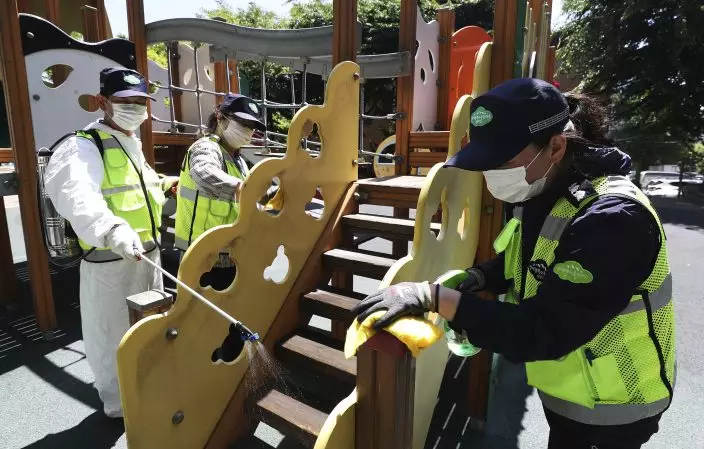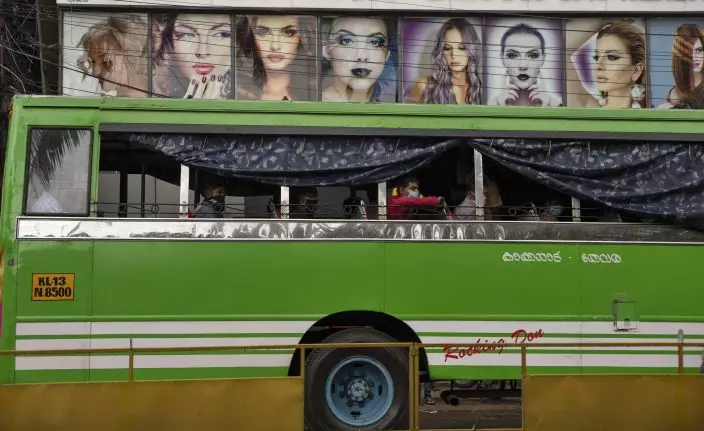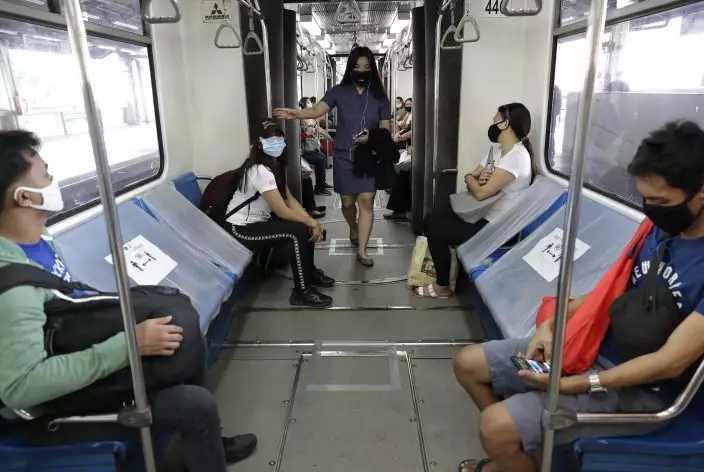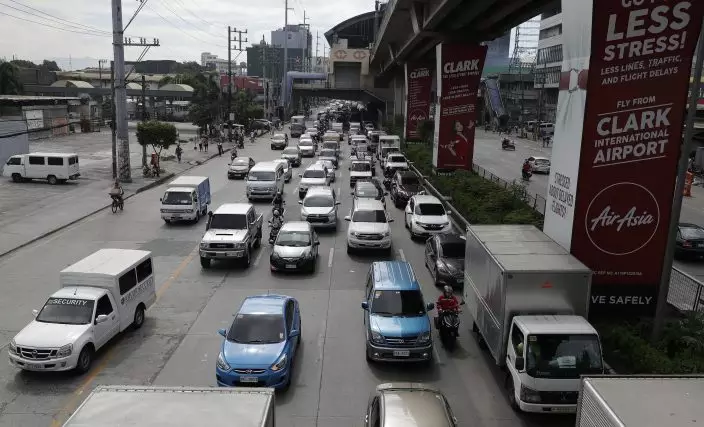The Latest on the coronavirus pandemic. The new coronavirus causes mild or moderate symptoms for most people. For some, especially older adults and people with existing health problems, it can cause more severe illness or death.
TOP OF THE HOUR:
— India climbs to 7th most cases in world.

Quarantine officials disinfect as a precaution against the new coronavirus at a park in Gunpo, South Korea, Monday, June 1, 2020. (Hong Ki-wonYonhap via AP)
— Public transit resumes in Bangladesh, more students return in China.
— Gridlock returns in Philippine capital under eased quarantine.
NEW DELHI — India has registered 230 deaths in the last 24 hours, bringing its total to 5,394 as the country begins its three-stage reopening on Monday.

Passengers wearing face masks sit inside a bus as it halts before a beauty salon during the coronavirus pandemic in Kochi, Kerala state, India, Monday, June 1, 2020. More states opened up and crowds of commuters trickled on the roads in many cities as India's three-phase plan to lift the virus lockdown kick started Monday amidst an upward trend in new infections and fatalities due to COVID-19. (AP Photo R S Iyer)
The lockdown is being eased in most places except for the containment zones now isolated due to coronavirus outbreaks.
The Health Ministry said India had 190,535 cases, which is the 7th most worldwide, exceeding Germany and France. More than 60% of India's COVID-19 fatalities have occurred in just two states — Maharashtra, the financial hub and entertainment hub of India, and Gujarat, the home state of Prime Minister Narendra Modi.
Experts say that although India’s cases are increasing rapidly, it is nowhere close to the peak of the outbreak. But the government is still easing the lockdown to ease some of the economic pain and hardship.

People board a train with seats arranged for social distancing measures to help curb the spread of the coronavirus during the first day of a more relaxed lockdown in Manila, Philippines on Monday, June 1, 2020. Traffic jams and crowds of commuters are back in the Philippine capital, which shifted to a more relaxed quarantine with limited public transport in a high-stakes gamble to slowly reopen the economy while fighting the coronavirus outbreak. (AP PhotoAaron Favila)
The railways will run 200 more special passenger trains from Monday and some states have opened their borders to vehicular traffic.
Maharashtra has allowed shops and offices to open outside containment zones and given a nod to the resumption of film shootings with some restrictions in place.
There are concerns that the virus may be spreading through India’s villages as millions of jobless migrant workers return home from cities during the lockdown.

Traffic builds up during the first day of a more relaxed coronavirus lockdown in Manila, Philippines on Monday, June 1, 2020. Traffic jams and crowds of commuters are back in the Philippine capital, which shifted to a more relaxed quarantine with limited public transport in a high-stakes gamble to slowly reopen the economy while fighting the coronavirus outbreak. (AP PhotoAaron Favila)
DHAKA, Bangladesh — Public transportation across Bangladesh reopened Monday with both long-distance and city buses carrying fewer passengers after three months of suspension to prevent the coronavirus from spreading.
In the capital, Dhaka, magistrates from the country’s road transport authority were checking if the buses were operating under health guidelines set by the government. Domestic flight operations resumed on at least three routes and trains were resuming.
Khalid Mahmud Chowdhury, junior minister for shipping, said passenger ferries that connect the delta nation’s vast southern coastal region with Dhaka also started their operations.
The reopening of the public transport service came amid concern that the number of infections and deaths could increase significantly in the coming weeks in the overcrowded country that has reported 47,151 cases including 650 fatalities.
The country’s fragile healthcare system is already stressed with reports saying Dhaka hospitals have no beds left for severely ill patients who would require intensive care and ventilation.
The government says the gradual reopening is crucial to revive the economy since growth is likely to plunge, leaving millions jobless.
South Korea is reporting a steady rise in cases around the capital as officials push to require entertainment venues to register their customers with smartphone QR codes so they could be easily located when needed.
The 35 new cases of COVID-19 reported Monday include 30 around Seoul. The figures released by South Korea’s Centers for Disease Control and Prevention brought national totals to 11,503 cases and 271 deaths.
Officials have reported 238 infections over the past five days, most of them in the Seoul metropolitan area where around half of South Korea’s 51 million people live, causing alarm in a country that had eased up on social distancing and started to send millions of children back to school. Hundreds of infections have been linked to nightspots, restaurants and a massive e-commerce warehouse near Seoul.
From Monday, a designated group of businesses in Seoul, Incheon and Daejeon will begin collecting the personal details of their customers with smartphone QR codes in a trial run before the requirement is expanded nationwide on June 10.
While local governments can enforce the QR codes on “high-risk” facilities such as nightclubs, bars, karaoke rooms, gyms and concert venues, Health Minister Park Neunghoo expressed hope that the technology would be expanded to churches, libraries, hospitals and restaurants.
BEIJING — China on Monday reported a spike in daily confirmed coronavirus cases to 16, all in newly arrived travelers.
Eleven were people arriving in the southwestern province of Sichuan, three in the northern region of Inner Mongolia and two in the southeastern manufacturing heartland of Guangdong. No new deaths were reported and just 76 people remain in hospital for treatment.
Another 400 were in isolation while being monitored for showing signs of COVID-19 or having tested positive for the disease without showing symptoms.
China has reported a total of 4,634 deaths among 83,017 cases.
With local transmissions having fallen to virtually zero, much of the country has reopened for business and Monday saw the further restart of classes in middle and high schools that had previously only allowed those preparing for graduation exams to return to campus. Kindergartens, and fourth- and fifth-graders will be allowed back next week as part of a staggered opening to prevent the further spread of the virus.
MANILA, Philippines — Traffic jams and crowds of commuters are back in the Philippine capital, which shifted to a more relaxed quarantine in a high-stakes gamble to slowly reopen the economy while fighting the coronavirus outbreak.
Commuter trains, taxis, Grab cars, special shuttle buses and motorcycles rumbled back on the road Monday but were only allowed to carry a small fraction of their capacity as a safeguard. Public transport is still limited by the relaxed quarantine rules, which forced the government to deploy dozens of buses but many commuters still waited for hours to get a ride.
“Many people are now allowed to go out and many industries are reopening so you’ll see a lot of vehicles ... but the situation remains abnormal,” said police Lt. Gen. Guillermo Eleazar, warning police would still go after violators who would not wear face masks and observe physical distancing.
Classes remain suspended for the next two weeks. Barber shops and beauty salons can open next week at a third of their capacity. The Philippines remains a Southeast Asian hot spot for the COVID-19 disease, with more than 18,000 infections and 957 deaths.
WASHINGTON — The U.S. has sent to Brazil more than 2 million doses of a malaria drug touted by President Donald Trump as potentially protecting against and treating the coronavirus, even though scientific evidence has not backed up those uses.
No large, rigorous scientific studies have found the drug, hydroxychloroquine, safe or effective for preventing or treating COVID-19, and some smaller studies have indicated worse outcomes from those taking the drug.
Brazil, now Latin America’s hardest-hit country, continues to see a surge in virus cases, and last week Trump announced that the U.S. was restricting travel from the country to prevent travelers from spreading the virus in the U.S.
In a joint statement with the Brazilian government on Sunday, the White House said the doses of hydroxychloroquine had been sent to Brazil as a prophylactic for front-line health workers and as a therapeutic for those who may come down with the virus. The White House said it was also delivering 1,000 ventilators to Brazil.
Follow AP news coverage of the coronavirus pandemic at https://apnews.com/VirusOutbreak and https://apnews.com/UnderstandingtheOutbreak


